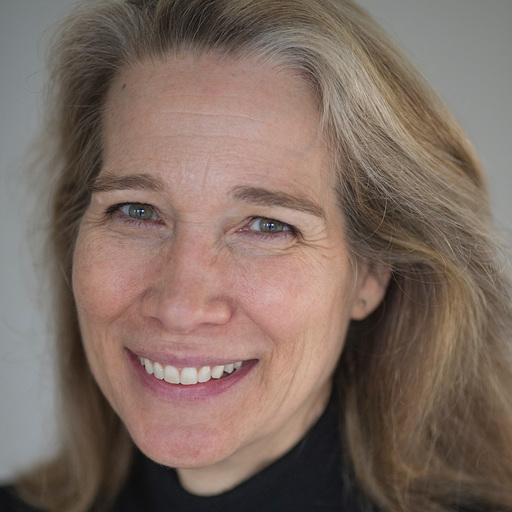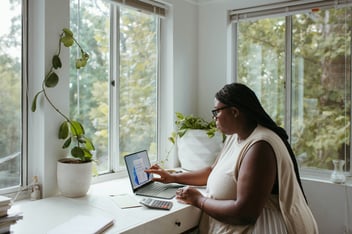As Jim Hightower said, “There's nothing in the middle of the road, but a yellow stripe and dead armadillos.”
Remote works. In-office works. Here’s what we know: optimal systems, policies and culture all depend on context, and that’s why hybrid is nearly impossible. We’ve all experienced the company-wide meeting with 8 people in one room and everybody else on Zoom. The people in the room get to talk with each other while the people on Zoom are left to stare into space wearing their “I’m listening face.” Then, once the call is over, the people in the room get to talk about what happened while the people on Zoom log off and are left out.The compromises you make when you “decide” to be hybrid mean nothing is optimal. Of course, mixing virtual and IRL is fine, if it happens once in a while. But if it’s your company’s everyday existence? You’re making it 10x harder for yourselves.
I spent 25 years running companies that were in-office. When we started AboveBoard, I had a toolbox of approaches that I knew worked and access to free office space. Yet, given the talent we needed, I knew we needed to hire remotely. Prevailing wisdom said the easiest path would have been hybrid. Instead, I gulped and we took the plunge into fully remote. It was a hard call, but the right one. My advice: Pick a lane.
AboveBoard is a fully remote company that gets together in person on a regular cadence. Here are five things that make working remotely work well for us.
To start, all of our systems and processes are set up to work virtually. Everything is designed for asynchronous written communication layered with video. We create a lot of documentation. Way more than is usual for a startup. We are disciplined about defining when a decision is in process and when it is approved, as well as where that process happens and is memorialized (for us, in Notion). Most dialogue happens openly on Slack and within documents via commenting. The specifics of those processes and systems are critical in a remote environment.
We allow for a lot of flexibility in everyone's workday. Set hours are especially silly when your team spans the globe and everyone is in a different time zone. Why do remote companies have standard work hours when people are in different time zones? It makes no sense. The concept of standardized working hours stems from the office paradigm. When you fully accept the remote paradigm and everybody’s working at home, who cares when they work? Yes, you’ve got to work in a way that interacts well with your team, but that’s actually a small amount of any given day. I think the desire for set working hours is really an outdated need for control.
At AboveBoard, members of our development team who live on the East Coast have regular meetings with our development team in India at 7 AM ET. It’s only an hour. How and when they complete the rest of their work is up to them. That kind of flexibility also applies to in-office work. At our recent in-person gathering in New York, one of our team members opted to avoid peak ridership times and join our gathering later, as they have little kids who aren’t vaccinated yet. You can give people the freedom to work in a way that is good for them and that works for the company.
We use Slack for work and to socialize. At its core, Slack is for doing work stuff, but it’s actually enabled our more social sides, giving us the ability to engage in back and forth chatter that helps us get to know one another and creates bonds. We embrace and make space for the kind of casual conversation that builds trust and connection. #IntoTheVoid, #Watercooler, #Pets and #Recipes are all popular channels where work almost never comes up.
We’re intentional about being together in person. Every year, we bring the whole company together. Our teams meet in person once a quarter and our executives gather every 6-8 weeks. When we’re together in person, we’re not just having meetings. We cowork, eat together, and socialize.This builds culture better than an agenda-packed day. All of that intentional in-person time builds trust and strengthens our ability to work together virtually. As we’ve seen when social media gets out of hand, we’re more likely to communicate appropriately and effectively with a person’s virtual persona if we’ve met them in person. When our co-workers are three dimensional, it makes us more mindful and compassionate.
Being together in person in a less formal way also fosters serendipitous collaborations. A couple weeks ago, six AboveBoard team members met up at True Search’s beautiful offices in New York City. It was so much fun (see the selfie above)! We had meetings, but mostly we worked side-by-side. Spontaneous idea sharing occurred that never would have happened online. And it inspired a new opportunity: We’re instituting Wednesdays as an AboveBoard coworking day in New York City so that team members who live nearby, or are passing through, can connect face-to-face.
And we keep experimenting. We do remote well, but there's plenty of room for improvement. Inspired by a recent Ezra Bookman talk at a Founders Friday, I’d like to try integrating ritual and somatic practices into our virtual meetings. I’m curious to see how ritual, movement, music, and even scents could help us collectively shift and center ourselves into our shared virtual space.
If you’re struggling with a hybrid model, or are on the cusp of choosing between remote, in-office, or hybrid, choose remote, or choose in-office. Don’t try to do both. Pick a lane. Pick a paradigm. And whichever you choose, do it intentionally and commit fully.
Image: Selfie taken at True Search’s New York offices of Bob Reish, VP Chief of Staff, Courtney Sloan, Head of Member Services, Lucinda Duncalfe, founder and CEO, Natasha Mulla, CMO, Danielle Roberts, Senior Account Executive and Amy Xie, Product Marketing





.png)


.png?width=352&name=Blog-Member-Spotlight_Clayton-Harris%20(1).png)
